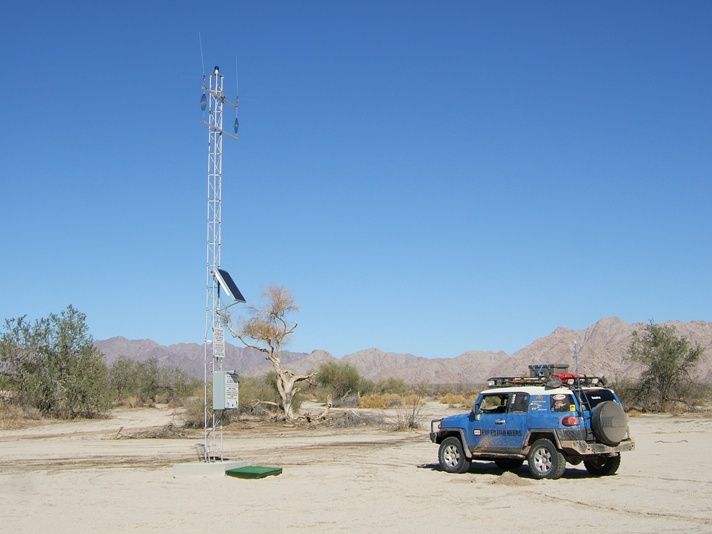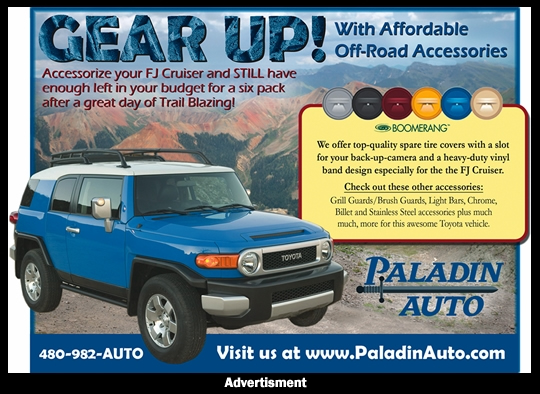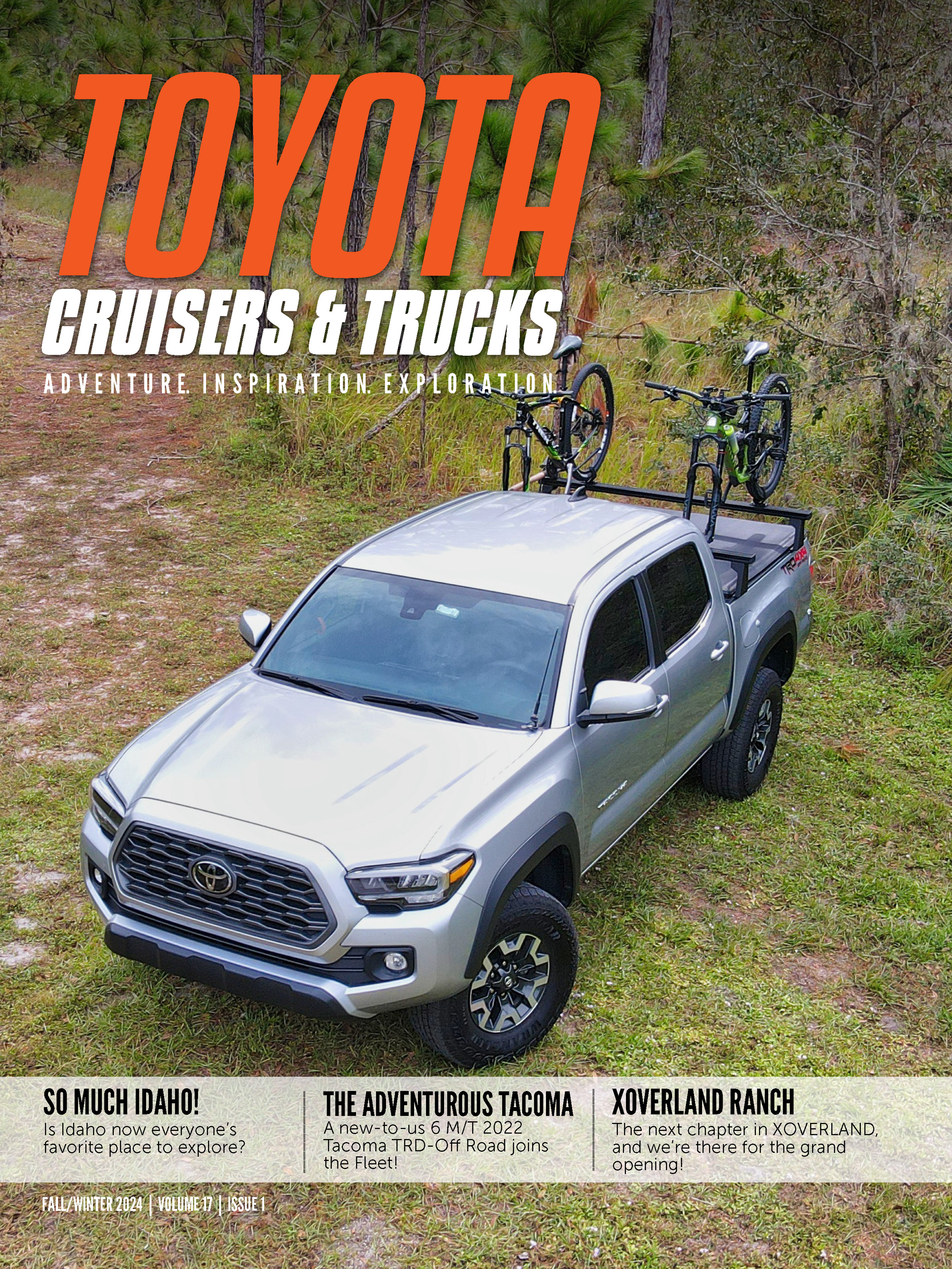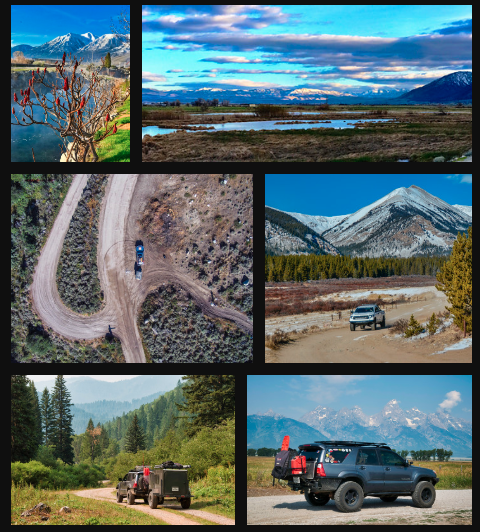Stay in Place
Short of your rig being at the bottom of a ravine and you somehow jumped to safety, or watching your FJ Cruiser transform into a river runner in a flash flood there really isn't a good reason to leave your vehicle, even if it just burned to the ground. Keep in mind that in almost all survival scenarios the vehicle is found first. Of course there might be a reason to leave, but it better be such a good one that even a small child would agree with you. The vehicle can be a source of shelter, raw materials, signal and more, so why leave all that behind just because in the movies the Hero always walks to town?
Rule of 3's
So why do we need to have a bag full of goodies when there are plenty of TV episodes full of folks who rip down tree limbs, make spears and soon have a forest fortress constructed. Well it all comes down to the 3's:
-Three minutes without air. We will skip past that one since it will be the rare one of us that has a full SCUBA setup within reach.
-Three hours without shelter. Of course this implies extreme conditions like blizzards, heatwaves, or rainstorms of the century.
-Three days without water. Nothing fun about this one, and we are talking about being healthy to start with, even less time if you are working hard, injured or have any medical conditions.
-Three weeks without food. This really is why you can toss out the fishing lines, hunting knives and snare cord. If you’re looking to go all Wildman of the Forest then close this magazine now and go sharpen a knife. In reality you are better off packing some emergency rations than a kit to fish or snare with.
Looking at the above time frames will help you realize that what you really need is some sort of shelter, water & filter/purifier, food and medical kit and most importantly a way to get found before that three week window comes around.
Don't Panic
Ah the Hitchhikers Guide to the Galaxy said it best, "Don't Panic", and these words are true in good times or bad. You want a ditch bag that is small enough to be within reach, light enough that you can carry it with one arm in case you are injured and that lets you get some comfort going quickly so you "Don't Panic". Personally mine includes my Spot Satellite Messenger, as this little device can call in 10 fellow 4x4 buddies or the helicopters, which goes a long way towards that comfy feeling. In addition I have my Adventure Medical Kits Pocket Survival Pack which is small yet includes a wealth of supplies from a signal mirror, to fire starter, to a little instruction sheet that I can read. Which brings up a great point: STOP. Sit, read, think and "Don't Panic". The moments you take to assess your kit, look at your surrounding resources and think might be what saves your life.
More of Less
Getting down to the nitty gritty of what should be in a bag, really it should be more of less, or in other words more of what you need and less of what was cool looking online or at the gun show.
You need water, so make sure you always have two 1L bottles in there. Two because one could bust and later they will be part of your filter setup. Nalgenes are nice but anything will do.
You need shelter, and three to five of those 3mil contractor big black (or better orange) garbage bags can serve a world of uses. You can make a poncho, shade, water catch, and give others the same. You can rap yourself in one like a burrito, stuff it with leaves for insulation and so much more. Of course they aren't as nifty as some snap together, military surplus thing, but they are cheap and easy to use.
You need comfort, and this is where a tablet stove, stainless camping cup (commonly called a sierra cup), some tea or coffee packets and emergency rations will come in. No matter the conditions, the act of making a snack will remind you that all is not lost in the world.
You need to take care of injuries, so this is where a decent first aid kit will help. Bandages, some medications if you need them, a syringe for wound washing, tape (medical or duct) and elastic wrap is plenty.
You need to signal, and this is where getting the garbage bags in orange is nice. Choosing any bright color for your bag is good, so is wearing bright clothes. Really anything other than starting some big forest fire to call for help is a great start for signaling.
And the last thing might cause some folks some concern, but you need a good large fixed blade knife and sharpening stone. Nothing crazy, just something that you can cut wood with, carve a bit or do other outdoors stuff with easily. I personally favor a Leatherman WAVE as I get two
knives and a host of other items. But no matter what get something in that pack. And please stay away from hatchets, machetes, shovels and such and they are too big for a bag that’s easily grabbed, too heavy to carry around and most importantly too easy to cause yourself injury with.
Practice Grasshopper Practice
So now you have gone to the thrift store and found a nice small daypack or duffle. You packed it with some of the above mentioned items and it is sitting in the middle of the floor of the backseat. You can easily reach it and it also has some Velcro straps to keep it in place in case of roll over but you can grab it quickly when fleeing from the rig.
Now what?
Well since everything in there is something you bought and could buy again, then get out there and practice with it.
Make a point to hit the trail on a Saturday. Set your alarm for some random time (wristwatch or cellphone alarm preferably) and when it goes off then that is where you pull over your rig, jump out and now pretend to be stranded. This is your campsite for the night. Make due with your kit. Sure it won't be completely comfortable but you will learn and you will survive. If this sounds too radical for you then at least pick a night to go camping and pick your spot to try your kit, but no matter what try it all and learn to use it. And please don't forget to change out the supplies in a timely matter, with the seasons is always a good rule but your climate and conditions will determine the best timing for some items.
You will notice I left out things like a map, compass, gps, laser pointer and all that. More often than not if you are skilled with these items then you will get more lost than found. Remember if you told folks where you were going and when you should be back then someone will start looking for you. And if you didn't do those simple things then honestly you might just be beyond the help of any magazine article.
Lance Blair is an overlanding enthusiast, expedition leader, and Tread Lightly trainer. He’s also the founder of Disabled Explorers, a non-profit group dedicated to helping mobility impaired outdoor enthusiasts gain access to the backcountry. He’s a regular contributor to FJCruiserForums.com, the Expedition Portal, and of course FJC Magazine. Lance can be contacted through the Disabled Explorers website.
{gallery}/issues/2010/july/expwheeling/{/gallery}

 Pilots & boaters call them Ditch Bags, survivalist might call them Flee Bags, and those of us who are all about being prepared call them Bug Out Bags. No matter what you call them the name is both the definition of why you need it and an explanation of what it is. Something very bad has happened and you have to ditch, flee or bug out from your vehicle and whatever is in your grab bag is all you have until help arrives.
Pilots & boaters call them Ditch Bags, survivalist might call them Flee Bags, and those of us who are all about being prepared call them Bug Out Bags. No matter what you call them the name is both the definition of why you need it and an explanation of what it is. Something very bad has happened and you have to ditch, flee or bug out from your vehicle and whatever is in your grab bag is all you have until help arrives.






